Diannely Antigua, Portsmouth poet laureate, says her trauma brings power to her writing
PORTSMOUTH — The first of many journals Diannely Antigua has written in throughout her life was a childhood Christmas gift from her sister. In it, she penned her feelings about her fifth-grade crush and AJ McLean from the Backstreet Boys.
“It was one of those journals with those locks on it that you could definitely pick with a bobby pin,” Antigua recalls. “But it was this whole new thing for me.”
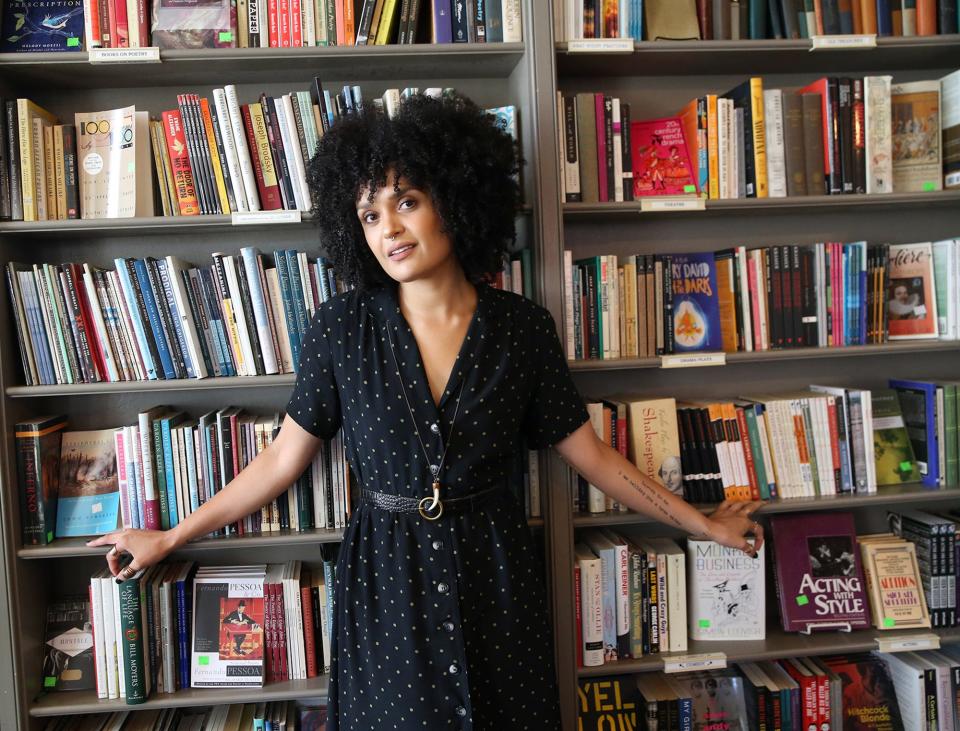
Before becoming Portsmouth's 13th poet laureate, Antigua filled pages upon pages of journals writing about her childhood, growing up, she said, amid domestic violence and religious abuse in a church where she had worshipped, her mental health, therapy, music, clothing and relationships.
Antigua, now 34 years old, has numbered each journal she uses. Starting at 9 years old, she's currently on her 38th journal.
“I grew up with a lot of tumult and I needed a safe haven,” Antigua said. “I needed that, or else I was going to disappear. Those journals became so important to me.”
In confronting trauma, writing has helped her heal.
“Those journals were my gateway into writing poetry,” Antigua said. “I just started experimenting.”
Antigua became the second youngest Portsmouth poet laureate and first person of color to hold the title when she was chosen for the role last year. Having only lived in Portsmouth since 2020, the Haverhill, Massachusetts, native was nominated for the position by Mike Nelson, chairperson of the Portsmouth poet laureate program’s board of directors, after he watched her share her work at Portsmouth Book & Bar readings.
In July, 14 months into her term, Antigua was bestowed with a career-altering recognition, as the Academy of American Poets named her as one of its 2023 Poet Laureate Fellows and awarded her a $50,000 grant. Only 23 writers across the nation were honored with the fellowship.
As she embarks on a public poetry campaign, Antigua is aiming to show the public poetry can be written by anybody and inspiration can be discovered anywhere.
How Antigua's writing evolved through her life experiences

One of the first poems Antigua ever wrote came in elementary school for a spring-themed poetry contest. She did not win. However, the experience further ignited her early love of writing, a path she set out to study when attending community college.
Leading up to her collegiate days, Antigua’s “preoccupations” she wrote about changed over time. In high school, she wrote in journals about her first boyfriend and about her relationship with God. But after exiting the church, her writing veered course toward a culture she hadn’t fully familiarized herself with yet.
“When I left the church at 19, I finally had that space to be able to discover things about myself on my own. I started experimenting with makeup and secular music and putting on jeans for the first time after 10 years of not being allowed to wear pants,” she said. “It was a decade of not being able to be who I was supposed to be. The journals were keeping at least part of my identity alive.”
Antigua earned an associate degree from Northern Essex Community College, then a bachelor’s degree in English from the University of Massachusetts Lowell. The budding poet took three years away from school before beginning working toward a fine arts degree at New York University, where she was mentored by professor and poet Sharon Olds, the former poet laureate for New York State.
Olds, Sylvia Plath and Anne Frank are three of Antigua’s biggest writing influences, notable authors who helped inspire her to step out of her creative comfort zone. For a long time, Antigua was writing mainly about her identity as a Dominican American, but not about the events of her past.
At New York University, she opened up about her experiences.
Her evolution may be best summarized by a tattoo she has on her forearm. "Listen to me," the inked message reads. "I am telling you a true thing."
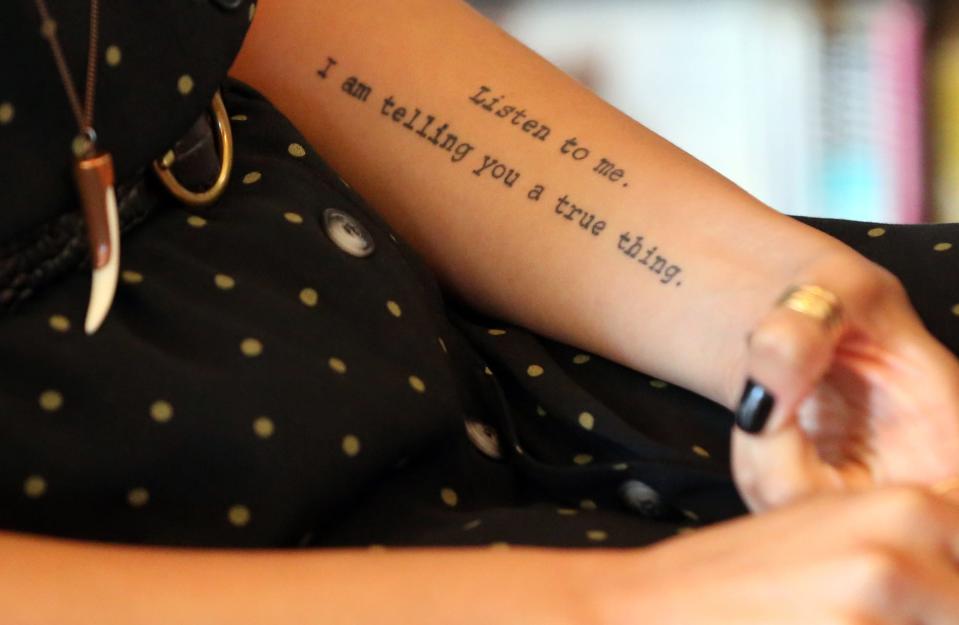
“I felt really called to write poems about that experience (being Dominican-American) because I felt like it was the only thing that was really interesting about me,” she explained. “I wasn’t really allowing any room for poems about mental illness or sexuality or religion. It was just about that because that’s what I thought was what people wanted from me as a brown person. When I got to NYU, I finally allowed myself to explore those stories more. When I did that, it felt like a rebellion like no other.”
'Poems are everywhere'
No topic is off limits for Antigua in her writing now, and anything she witnesses could serve as a conduit to crafting a new poem. When she was studying at New York University, she once stepped off the train while heading home to Brooklyn and witnessed a man stealing from a fruit stand.
Antigua pulled out her phone, typed a few words and moved on from the moment. Months later, during a January snowstorm, Antigua was hunkered down in her apartment and decided to spend time writing. She scrolled through notes in her phone and found what she previously wrote: "As I watch a man steal fruit on the corner of Myrtle Ave and Broadway, I want to know what to do with the memory.”
She wrote the line at the top of the page and kept going. The now-published poem “Picked” is about sexual abuse.
“Part of my philosophy around poetry is that anything can be a poem. Poems are everywhere,” Antigua said. “I walk around the world seeing poems in everything that I do.”
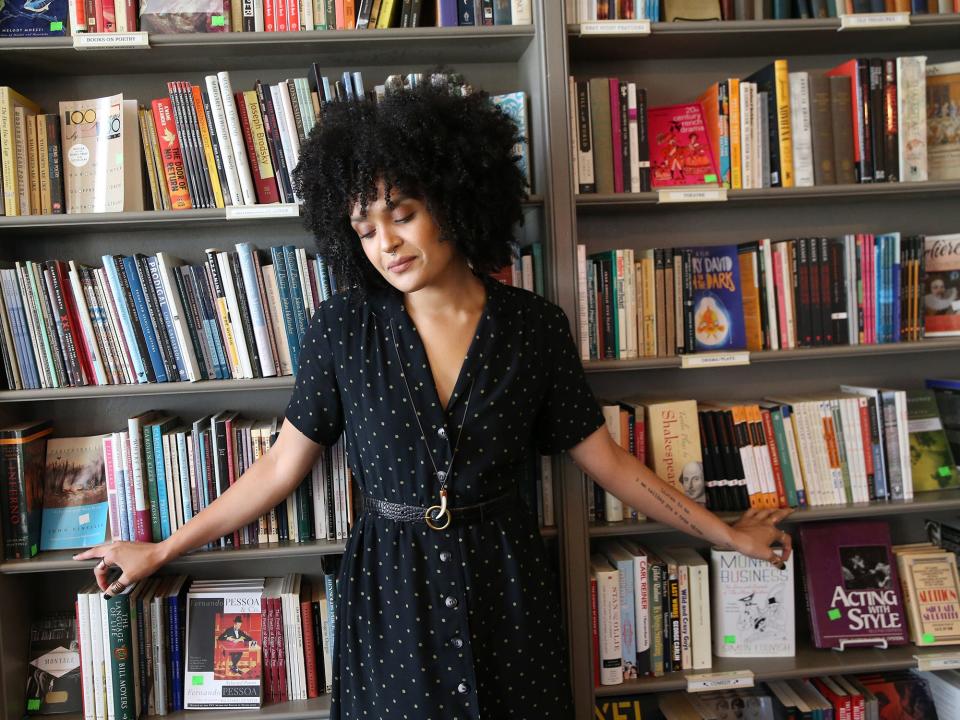
“It is really honest and vulnerable and raw and raunchy,” she said of her work. “It’s everything possible all in one. I cannot talk about my journey writing poetry without talking about all of the trauma. They go hand in hand.”
The writer says each of her poems in some fashion tie back to her experiences with domestic violence or religion and the abuse she experienced within a non-denominational Pentecostal group she used to associate with.
One poem, “Day of Pentecost,” describes Antigua’s experience of receiving the Holy Ghost and speaking in tongues when she was 10 years old. At a church in Canada, where she and other members were attending a service, she began to speak in what felt like gibberish as “Peace in the Midst of the Storm” played in the background.
“I want to understand why my tongue moved and a voice came out and the voice said nothing like something important, maybe shamalashamala shamalahai,” the poem reads. “And maybe that meant Save me or Leave me or maybe it was Make me disappear.”
“I just remember that I was praying, and my tongue started moving in this way that it never had before and the voice was very shrieky,” she recalled.
Another poem, “Beauty Lesson,” recounts her time living with domestic violence. Written about her mother and the loving lessons she bestowed on Antigua, the poem ends by describing Antigua’s stepfather yelling at her mother on their wedding day, while her mother was in her flowing wedding dress.
The struggle chronicled in the poem, Antigua said, is meant to resemble a well-known quote from Stephen Chbosky’s “The Perks of Being a Wallflower”: “We accept the love that we think we deserve.”
Antigua wanted to be just like her mother as she got older, which led to realizations about what she deserved in her relationships.
“That would go on to haunt me later in future relationships where there was also violence and abuse as well, and I had to go through that lesson for myself,” she said.
What is the 'Bread and Poetry' project?
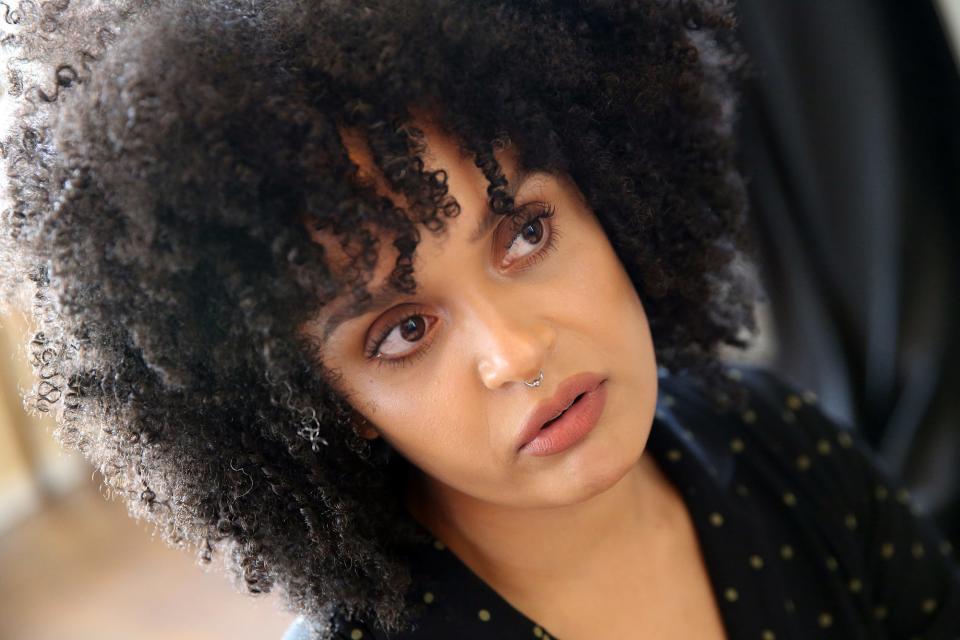
Mental health is at the forefront of Antigua’s poetry mission, a topic she explores along with discussions on body neutrality, racism, nature and the environment on her podcast titled “Bread and Poetry.”
Antigua, a bread fanatic who said she should probably eat gluten-free, aims to make poetry accessible to everyone, a goal she works toward through her podcast. The “Bread and Poetry” project's name is an homage to a quote Antigua cherishes from the late Salvadoran poet Roque Dalton: “I believe the world is beautiful and that poetry, like bread, is for everyone.”
Each episode of the podcast features a guest poet. Antigua asks each guest their favorite type of bread, for them to recall a “powerful, beautiful or challenging memory that includes bread,” and discussion on a poem the guest wrote, as well as a poem they love that they didn’t write.
With the $50,000 grant from the Academy of American Poets, Antigua hopes to hire someone to produce her podcast as she focuses on continuing to partner with local and state organizations, including Haven and NH Panther, for poetry workshops and readings.
Antigua's message to survivors: Healing is an ongoing process
Antigua’s work with Haven, which provides violence prevention and support services in Seacoast New Hampshire, stems from her history of utilizing similar services with her family as a child. Due to her biological father’s abuse, she and her family left their Massachusetts home and stayed in shelters as far away as Connecticut, she said.
Today, Antigua works through complex post-traumatic stress disorder, but gives back by partnering with Haven.
“We definitely needed those services. Our safety depended on those services,” she said. “It’s so important for me to give back to an organization that is offering those services to survivors.”
Antigua’s message to victims of domestic violence and abuse is to remind them that healing from trauma is a long, winding journey that can often lead to survivors feeling impatient over their progress.
“Survivorhood is ongoing. Just because I'm not in that situation anymore right now, it is an ongoing process of healing that you have to do,” she said. “That’s hard to grasp and to even admit to myself because I think at times, I’ve been impatient with myself.
“The truth of the matter is that those really traumatic events are really imprinted on our DNA. They’re infused to us and it’s part of our journey in life to learn how to manage and learn how to work through that. The residue of that remains.”
What's next for Antigua
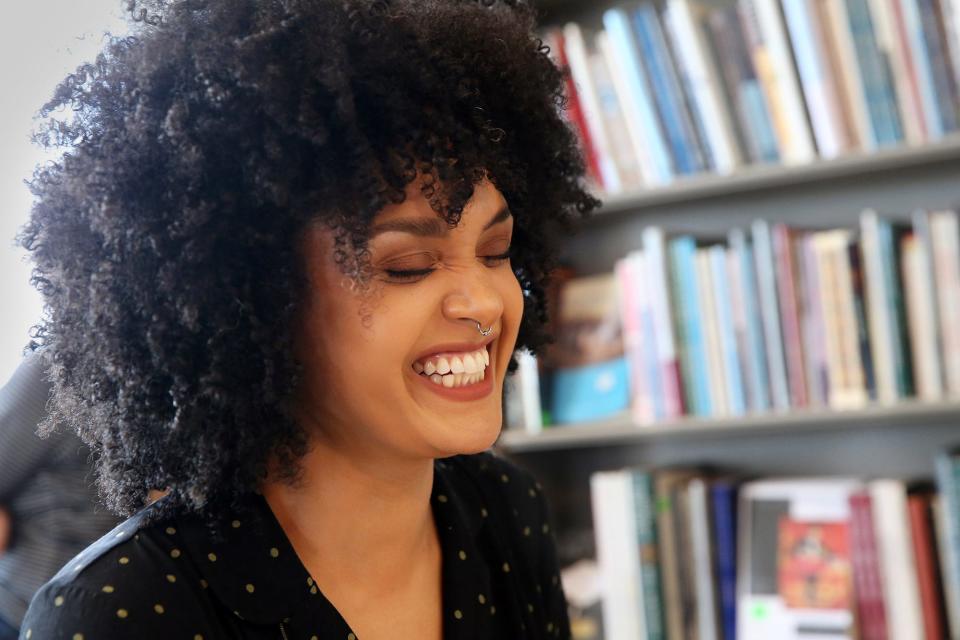
Antigua’s community work coincides with beginning to teach at the University of New Hampshire as its inaugural poet-in-residence, in addition to publishing her second book next year and serving as Portsmouth’s poet laureate until May 2024. She has no plans to slow down talking about bread — her current favorite is fougasse — and poetry.
“I really just want to enact social change through the lens of poetry,” she said.
To prospective poets unsure of how to begin writing, Antigua’s advice is for them to stay true to their voice and to their experiences. As for why she believes poetry is important in the modern day, she cited U.S. poet laureate Ada Limon’s poem “In Praise of Mystery: A Poem for Europa,” which the National Aeronautics and Space Administration is planning to send on a mission to Europa, one of Jupiter’s moons, next year.
“That’s why poetry is important because it could literally go to Jupiter’s moon,” Antigua said.
The poet’s second book “Good Monster” will be published by Copper Canyon Press next year. Antigua’s debut poetry collection, “Ugly Music,” won the Pamet River Prize and a 2020 Whiting Award.
This article originally appeared on Portsmouth Herald: Portsmouth poet laureate Diannely Antigua takes on abuse in her work

